Is Zinc Good for Hair Growth? Here's What the Science Says

Key Takeaways
Dozens of vitamins and minerals play important roles in your hair's health. While most people think of omega-3 fatty acids, vitamin C, beta carotene, vitamin D, biotin, coconut oil, collagen, and jojoba oil when looking for hair products and supplements, zinc is often overlooked. Aside from promoting hair growth, it's crucial for immune response, reproduction, and wound healing, among other functions.
Zinc deficiency affects around 17 percent of the world's population, most heavily impacting the developing world. One notable side effect of this deficiency is hair loss, so zinc supplements are often considered a potential hair loss treatment.
But is there any science to back this up? Read on as our experts dig into:
- The potential causes of hair loss
- The effect that zinc may have on hair growth
- The benefits of zinc on your overall health
What Causes Hair Loss?
Hair loss is more commonly seen in men (known as male pattern baldness); however, female pattern hair loss can also occur in some women. Anyone who has experienced hair loss may have tried any of the countless remedies available to promote hair growth.
So, what exactly can lead to unwanted hair loss? According to research, there are a number of factors that may be at play, such as:
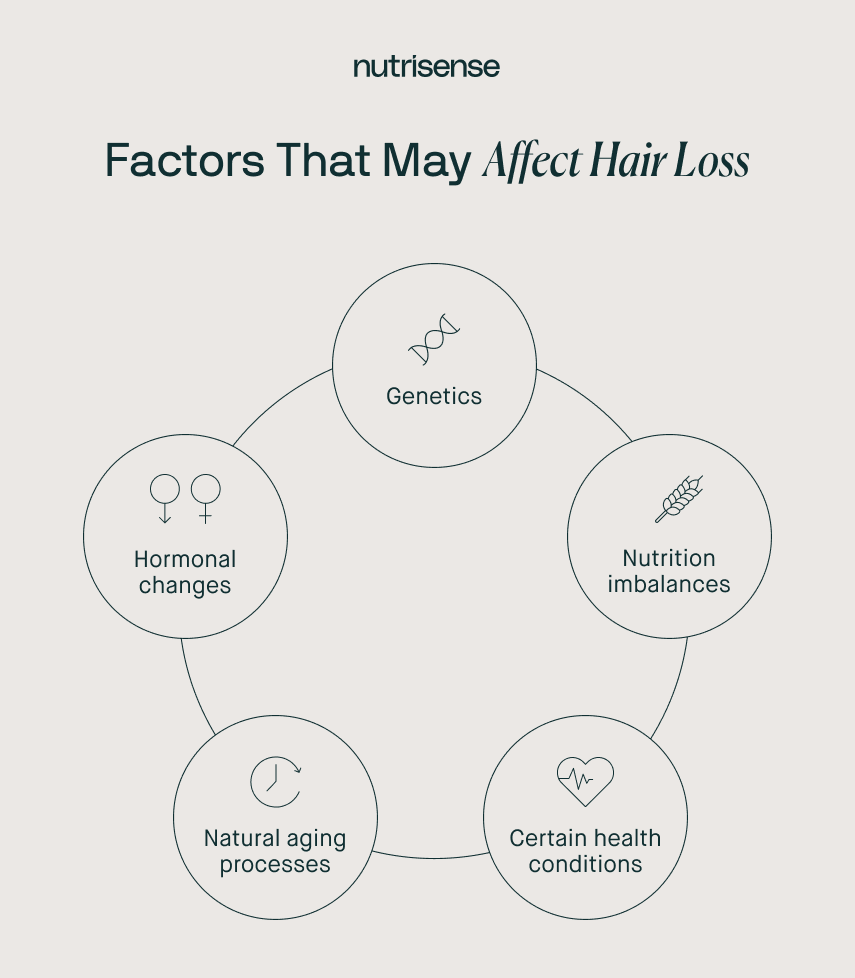
On top of that, how you treat your hair shaft, scalp, and hair follicles can also affect hair growth. Here are some common causes of hair loss:
- Overdrying wet hair with the hair dryer and damaging the scalp and hair shaft
- Overworking dry hair with a lot of styling and causing hair breakage and hair damage
- Putting on products that cause allergic reactions to your scalp, resulting in seborrheic dermatitis
- Not massaging your scalp to promote blood circulation and healthy hair follicles
As a result, a wide range of hair growth treatments, masks, and supplements are marketed to people with thinning hair who want to grow thicker hair.
But could nutritional factors such as the amount of zinc you consume play a role in healthy hair growth? Yes, zinc may play a role! But before we dive into how much and how, let's start by looking at the importance of zinc overall as part of a healthy diet.
Why We Need Zinc
Zinc is an essential micronutrient that plays a crucial role in enzymatic, structural, and regulatory functions in the body. Over 300 different enzymes depend on zinc to properly perform their jobs throughout the human body.
These enzymes participate in very important metabolic functions, including:
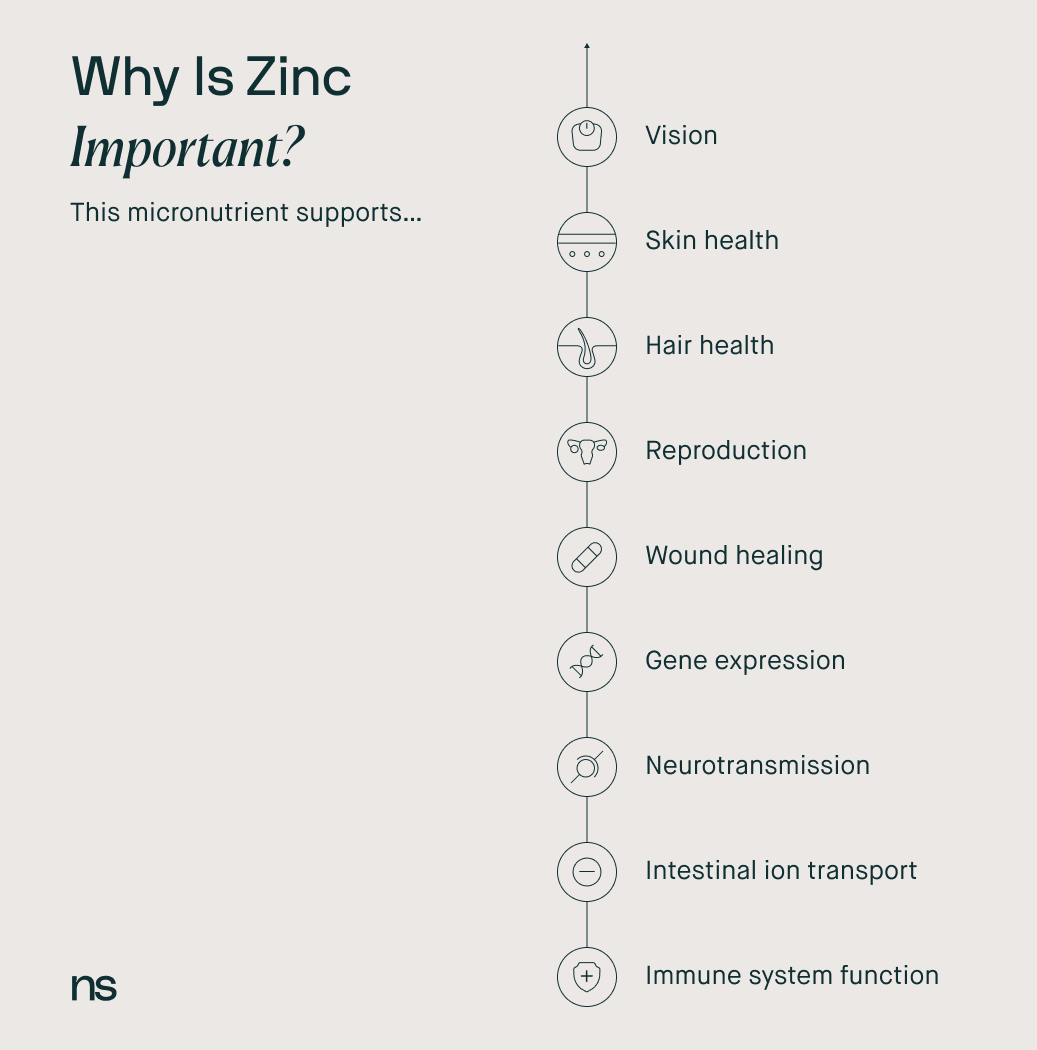
- Growth and development
- Skin health
- Immune system function
- Neurotransmission
- Vision
- Reproduction
- Intestinal ion transport
- Gene expression
- Wound healing
- Hair health
- Maintaining healthy blood pressure and blood flow
Zinc plays an antioxidant and anti-inflammatory role in the body, helping regulate oxidative stress and inflammatory cytokines in the body. It's necessary for synaptic signaling in the brain, hormone release and regulation, and nerve transmission.The recommended daily allowance (RDA) of zinc is:
- 8 milligrams per day for women
- 11 milligrams per day for men
Supplementing with Zinc for Hair Growth

So, why might zinc be connected to keeping your hair healthy? Some clinical trials have shown that our hair follicles are closely intertwined with parts of the immune system that support healthy hair growth. As a result, zinc deficiency is thought to be associated with premature hair loss.
For this reason, zinc supplements have historically been recommended as a hair loss treatment. But is zinc that effective for hair loss? It turns out that's still up for debate.
In a study, 15 alopecia patients with low serum zinc levels were given zinc supplements for 12 weeks. Out of the 15 patients, seven showed a marked recovery, meaning they experienced hair regrowth of more than 60 percent on their hair loss patch.
An interesting thing to note here is that the individuals being studied already had low zinc levels at the onset. This means that additional zinc may have been effective in as much as it corrected the underlying deficiencies present. But what about if you're already meeting your zinc needs? Is more zinc going to equal better hair growth?
Many studies have explored the dose-dependent effect of nutrients, revealing the truth that more isn't always better. Just as too little zinc may impair the immune system, too much zinc may do the same thing. While too little zinc may negatively impact hair growth, some research also suggests that consuming excess zinc can lead to hair shedding or hair loss.
Whether zinc positively affects hair growth might depend on many factors, and more research is still needed to establish a direct link.
What To Know About Zinc Deficiency
Because zinc is crucial for so many functions in the body, a zinc deficiency can affect many different tissues and organs, including your:
- Skin health
- Bone health
- Digestive system
- Reproductive system
- Immune system
- Central nervous system
Diarrhea and delayed growth can be common signs of zinc deficiency in infants and children. Alopecia delayed growth, and frequent infections may affect older children with zinc deficiency. In older adults, zinc deficiency can cause changes in cognitive function and mental health.
If you are concerned about whether your diet includes enough zinc, consult your doctor and qualified nutrition professional for further guidance.
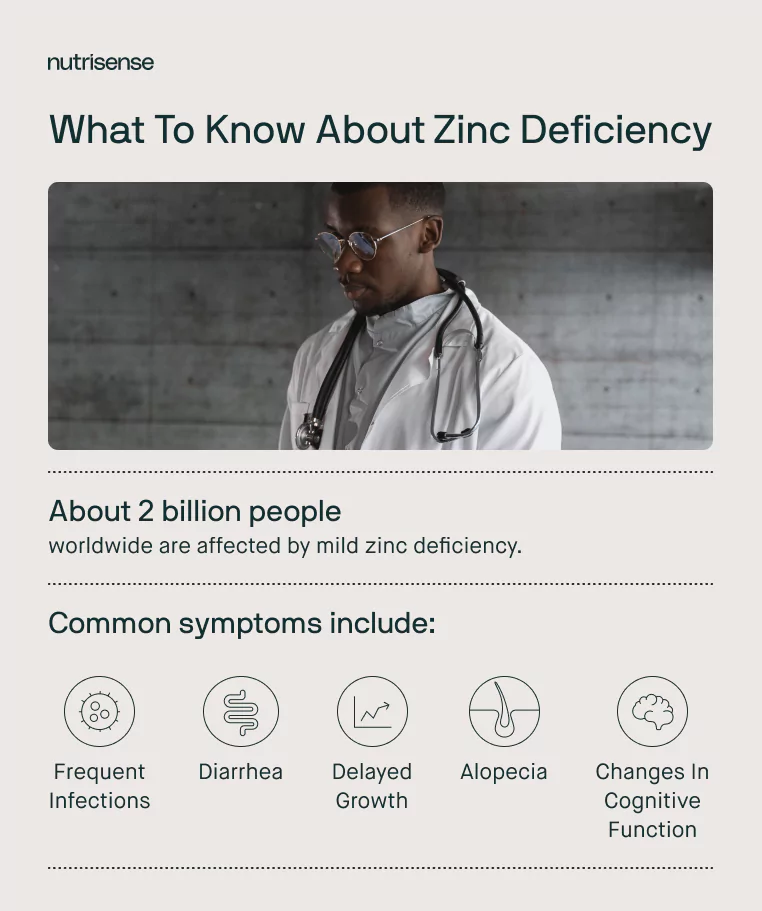
Diarrhea and delayed growth can be a common sign of zinc deficiency in infants and children. Alopecia, delayed growth, and frequent infections may affect older children with zinc deficiency. In older adults, zinc deficiency can cause changes in cognitive and psychological function.
If you are concerned about whether your diet includes enough zinc, consult your doctor and qualified nutrition professional for further guidance.
Who Is At Risk for Zinc Deficiency?
As mentioned earlier, dietary factors may lead to zinc deficiency. But there are also certain groups who may be at a greater risk of zinc deficiency than others. These include:
- Premature and low-birth-weight infants
- Older breastfed toddlers with inadequate intake of zinc-rich complementary foods
- Children and adolescents
- Pregnant and lactating (breast-feeding) women, especially adolescents
- People who receive intravenous feedings
- Malnourished individuals, including those with protein-energy malnutrition and anorexia nervosa
- Those with severe or persistent diarrhea or malabsorption
- People with celiac disease or inflammatory bowel conditions
- Alcoholics and those with alcoholic liver disease
- Those with chronic kidney disease
- Those with sickle cell anemia
- Adults aged 65 years and older
Who Should Take a Zinc Supplement?
If you are considering increasing your zinc intake for any reason, it's always a good idea to boost your whole-food sources of zinc before considering supplements. The type of supplement is an important factor to consider, too, as the body may not absorb some types of zinc supplements as well as others. So while anyone can take a supplement relatively safely, it depends on many individual factors, including what your rcommended daily intake is depending on your age, sex, and other conditions.
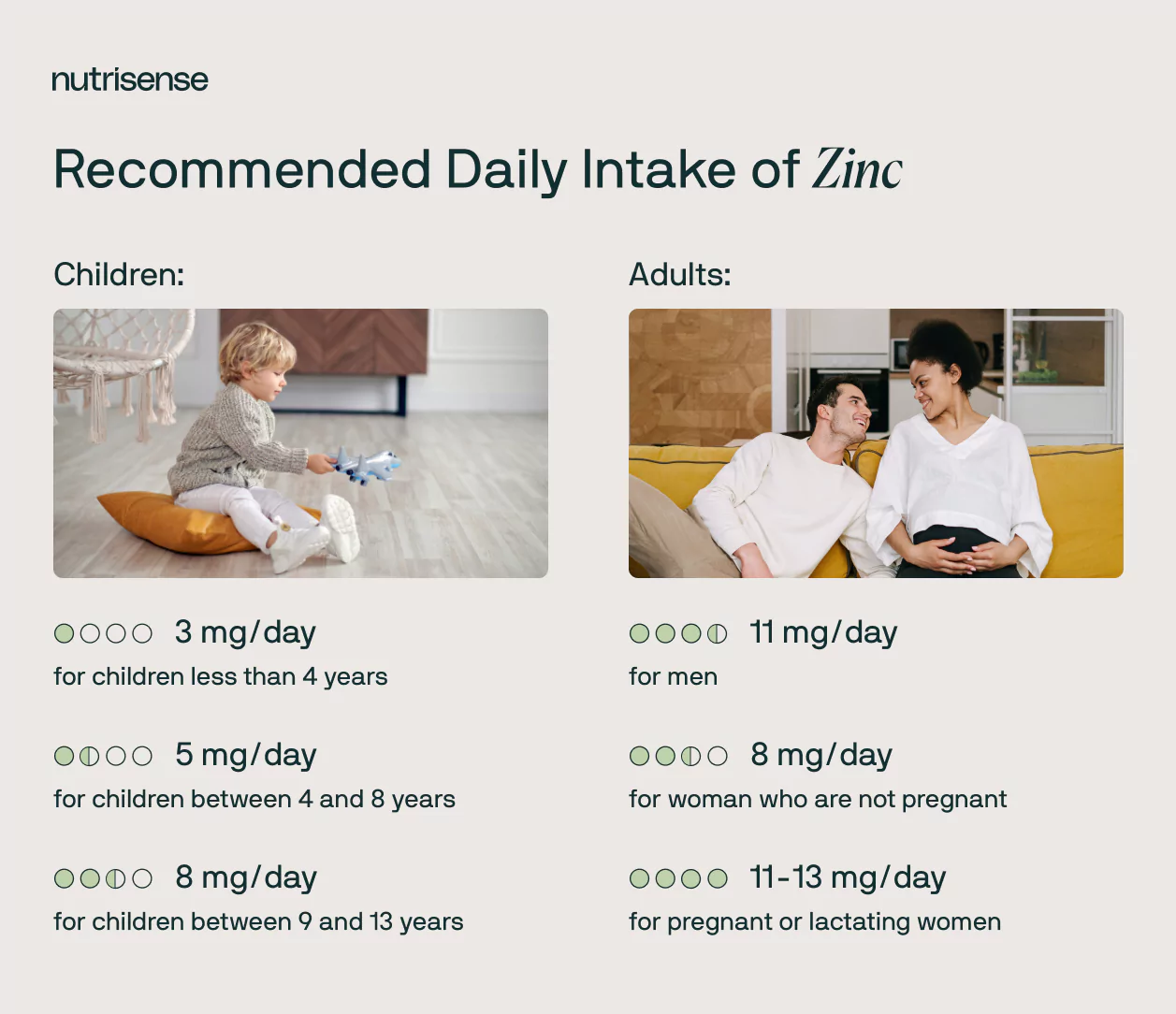
Remember to seek medical advice from your doctor and work with a professional like a registered dietitian or nutritionist to ensure a nutritionally balanced diet before taking new supplements.
Zinc Supplements and Blood Sugar
You may also wonder if zinc affects blood sugar. Interestingly, some meta-analyses have shown that zinc supplementation may reduce fasting glucose levels, postprandial glucose levels, and HbA1c levels in those with diabetes.
In these studies, zinc also appeared to reduce total cholesterol and triglycerides in patients with and without diabetes. However, it's important to note that these studies didn't all control dietary zinc intake, and they didn't all account for possible current dietary deficiencies in zinc.
Because of this, the benefits of supplementation could also be seen with an increase in zinc-rich foods. Research in this area is still lacking; more is needed to determine zinc's effect on blood sugar.
Can You Take Too Much Zinc?

One reason to check with your doctor before taking zinc supplements is the potential side effects. Some known side effects of zinc supplements may include abdominal pain, acute diarrhea, nausea, and even impaired immunity.
Another possible consequence of long-term consumption of large doses of zinc is zinc toxicity and copper deficiency. For this reason, the U.S. Food and Nutrition Board has set the tolerable upper intake level for adults at 40 milligrams per day, including both dietary and supplemental intakes of zinc.
How to Add More Zinc to Your Diet
The Nutrisense nutritionist team recommends sourcing essential nutrients from whole food sources (like sardines, soybeans, and yogurt) before supplementation when possible. If you're looking to add more zinc to your diet, here are some zinc-rich foods you may want to try adding into your diet:
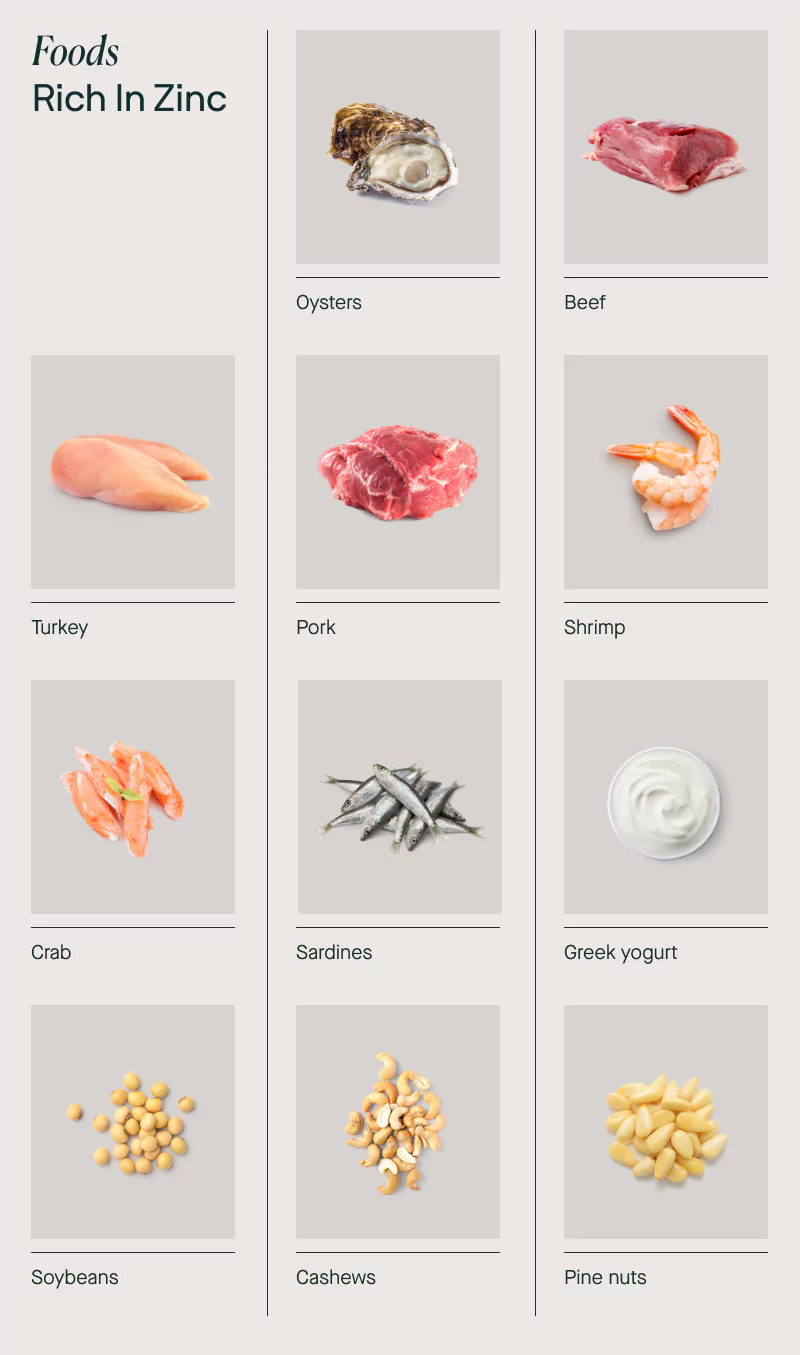
Nutrients That May Interact With Zinc
If you supplement with zinc, there are a few potential interactions that zinc can have with other nutrients that you may want to keep in mind. Remember that before adding supplements, you may want to consult your doctor or a registered dietitian for guidance.
Here are some of the nutrients that may interact with zinc:
Copper
Large doses of zinc (50 milligrams per day or more) over an extended period may interfere with the bioavailability of copper, another essential mineral needed for many body processes. Smaller doses of zinc do not seem to affect copper absorption, and high copper intake doesn't affect zinc absorption.
Iron

Iron and zinc both compete for the absorption pathways. Dietary levels of iron don't appear to affect zinc absorption, but high zinc supplementation may negatively affect iron levels.
Calcium
Calcium and zinc may have interactions in certain groups of people. For example, one study showed that increasing calcium intake in the form of milk or calcium phosphate reduced zinc absorption and zinc balance in postmenopausal women.
Folate or Folic Acid (Also Known as Vitamin B9)
Zinc-dependent enzyme actions can increase folate's bioavailability. However, there aren't enough studies to demonstrate whether folate affects zinc's balance and absorption.
Vitamin A
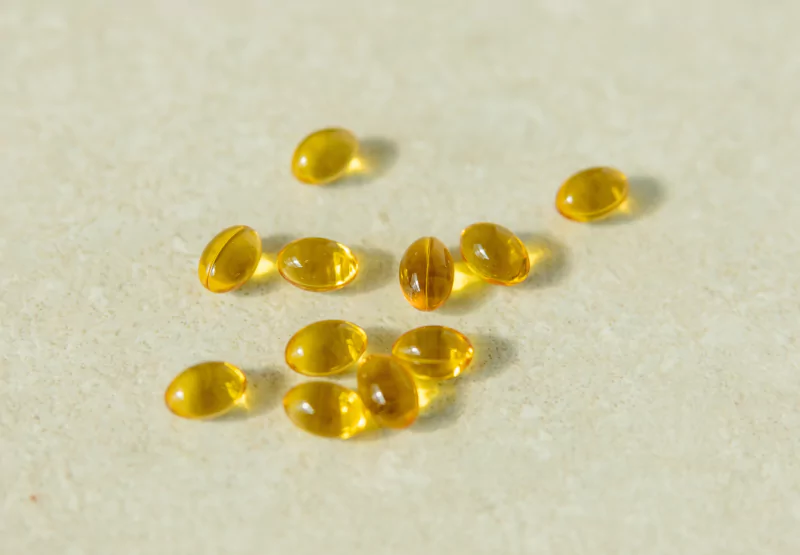
Zinc is a protein component necessary for transporting vitamin A in the blood. Insufficient zinc may decrease vitamin A levels. Zinc deficiency has also been associated with a decreased release of vitamin A from the liver. This may contribute to the symptoms of night blindness seen with zinc deficiency.
The Bottomline on Zinc and Hair
So, should you or should you not when it comes to supplementing with zinc for hair growth? Yes, it may help with hair growth for some people. But like many health questions, it does depend on your individual needs.
While zinc plays a crucial role in many bodily functions, including hair health, its direct impact on hair growth is not clear-cut. Zinc deficiencies have some links to hair loss, so if you’re deficient, supplementing can help boost hair growth.
However, taking too much zinc can also have adverse effects, including potential hair shedding. So, the benefits will depend on individual factors such as your current zinc levels and overall diet. Before starting any new supplement, consult a healthcare professional to ensure it’s appropriate for your needs and won't interfere with other nutrients or medications.
Find the right Nutrisense programto turn insight into progress.
Find What Works for You with Nutrisense's Personalized Guidance
While we’ve discussed how zinc can promote hair growth and lower blood sugar levels, remember that supplements and nutrition are nuanced. Finding what works for you takes experimentation and guidance. To learn more about your nutrition and how to optimize it, consult with a board-certified registered dietitian or nutritionist.
When you join the Nutrisense program, you can access our team of credentialed, registered dietitians and nutritionists through various support options, including 1:1 video calls. You can also get access to a continuous glucose monitor (CGM) so you can track your blood glucose levels and see how various dietary and lifestyle factors impact them. Nutrisense nutritionists can teach you how to interpret this complex data and make personalized recommendations for improving your health based on your unique responses.
Begin with our quiz to see how Nutrisense can help you take control of your health.
Go Beyond Glucose Data with Nutrisense
Your glucose can significantly impact how your body feels and functions. That’s why stable levels are an important factor in supporting overall wellbeing. But viewing glucose isn't enough. Nutrisense, you’ll be able to learn how to use your body's data to make informed lifestyle choices that support healthy living.
One-to-one coaching
Sign up to access insurance-covered video calls to work with a glucose expert: a personal registered dietitian or certified nutritionist who will help tailor your lifestyle and diet to your goals.
Monitor and measure what matters
With the Nutrisense CGM Program, you can monitor your glucose with health tech like glucose biosensors and continuous glucose monitor (CGM)s, and analyze the trends over time with the Nutrisense App. This will help you make the most informed choices about the foods you consume and their impact on your health.
Find your best fit
Ready to take the first step? Start with our quiz to find the right Nutrisense program to help you take control.

Liz has a Master of Science degree in Clinical Nutrition and Integrative Health and is a board-certified nutrition specialist (CNS) and a licensed dietitian nutritionist (LDN). As a nutritionist, Liz has educated and counseled 100s of clients in areas such as weight loss, hormonal imbalances, and gastrointestinal diseases.


.webp)

